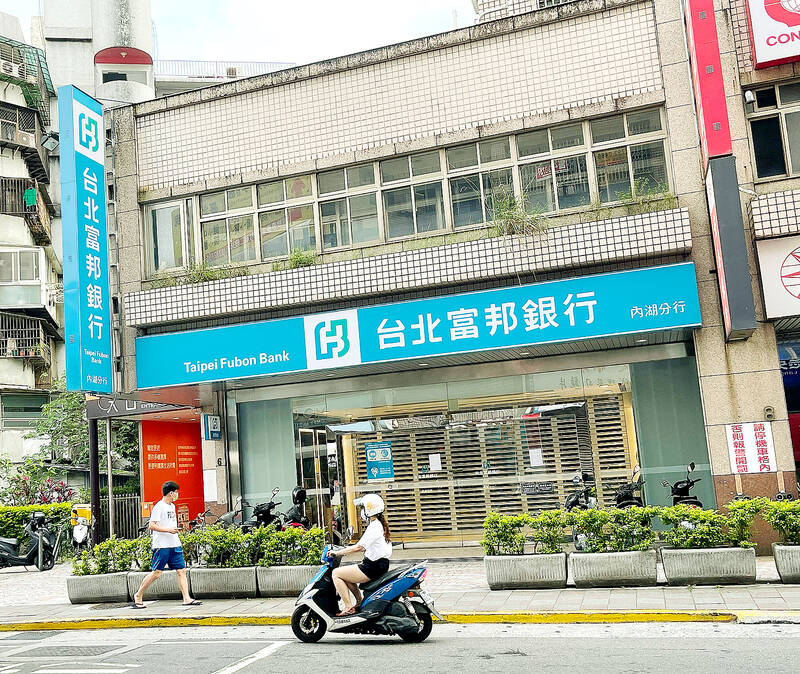Taipei Fubon Commercial Bank (台北富邦銀行) has obtained regulatory approval to merge with Jih Sun International Bank (日盛銀行), after parent Fubon Financial Holding Co (富邦金控) completed its acquisition of Jih Sun Financial Holding Co (日盛金控) in November last year.
After the deal takes effect on April 1, Jih Sun International Bank would cease to exist and Fubon would become the nation’s third-largest bank in terms of assets, the Financial Supervisory Commission said on Tuesday.
Taipei Fubon Bank’s assets would expand to NT$4.27 trillion (US$140.77 billion) from NT$3.99 trillion, behind Bank of Taiwan’s (臺灣銀行) NT$5.95 trillion and CTBC Bank Co’s (中信銀行) NT$4.57 trillion, the commission said.

Photo: CNA
Taipei Fubon and Jih Sun Bank said the merger would provide wider business deployment and allow for better customer services.
They also expect it to help promote resource integration and increase market competitiveness.
Taipei Fubon Bank would retain all employees and 44 branches of Jih Sun Bank, raising its total number of branches to 179, the largest among private banks and the fifth-largest among all banks, Banking Bureau Chief Secretary Hou Li-yang (侯立洋) said.
It would also boost its market shares in the deposit and loan businesses in Taiwan, Hou said.
Taipei Fubon Bank posted a record net profit of NT$22.64 billion last year, up 21 percent year-on-year, thanks to higher fee incomes and investment gains.
However, Fubon Financial’s pre-tax profit of NT$60.6 billion last year fell short of market expectations, as its insurance arm was burdened by COVID-19-related claims, regulatory filings showed last week.
Fubon Financial last week announced that it would recruit 6,500 people to meet increasing demand for the company and its subsidiaries’ services.
The new openings range from overseas business development to information technology and security, data analytics, customer service and risk management, the company said.
The company would also recruit 50 to 60 management associates, it said.
The new hires are to start working in March, it added.

UNCERTAINTY: Innolux activated a stringent supply chain management mechanism, as it did during the COVID-19 pandemic, to ensure optimal inventory levels for customers Flat-panel display makers AUO Corp (友達) and Innolux Corp (群創) yesterday said that about 12 to 20 percent of their display business is at risk of potential US tariffs and that they would relocate production or shipment destinations to mitigate the levies’ effects. US tariffs would have a direct impact of US$200 million on AUO’s revenue, company chairman Paul Peng (彭雙浪) told reporters on the sidelines of the Touch Taiwan trade show in Taipei yesterday. That would make up about 12 percent of the company’s overall revenue. To cope with the tariff uncertainty, AUO plans to allocate its production to manufacturing facilities in

Taiwan will prioritize the development of silicon photonics by taking advantage of its strength in the semiconductor industry to build another shield to protect the local economy, National Development Council (NDC) Minister Paul Liu (劉鏡清) said yesterday. Speaking at a meeting of the legislature’s Economics Committee, Liu said Taiwan already has the artificial intelligence (AI) industry as a shield, after the semiconductor industry, to safeguard the country, and is looking at new unique fields to build more economic shields. While Taiwan will further strengthen its existing shields, over the longer term, the country is determined to focus on such potential segments as

TAKING STOCK: A Taiwanese cookware firm in Vietnam urged customers to assess inventory or place orders early so shipments can reach the US while tariffs are paused Taiwanese businesses in Vietnam are exploring alternatives after the White House imposed a 46 percent import duty on Vietnamese goods, following US President Donald Trump’s announcement of “reciprocal” tariffs on the US’ trading partners. Lo Shih-liang (羅世良), chairman of Brico Industry Co (裕茂工業), a Taiwanese company that manufactures cast iron cookware and stove components in Vietnam, said that more than 40 percent of his business was tied to the US market, describing the constant US policy shifts as an emotional roller coaster. “I work during the day and stay up all night watching the news. I’ve been following US news until 3am

COLLABORATION: Given Taiwan’s key position in global supply chains, the US firm is discussing strategies with local partners and clients to deal with global uncertainties Advanced Micro Devices Inc (AMD) yesterday said it is meeting with local ecosystem partners, including Taiwan Semiconductor Manufacturing Co (TSMC, 台積電), to discuss strategies, including long-term manufacturing, to navigate uncertainties such as US tariffs, as Taiwan occupies an important position in global supply chains. AMD chief executive officer Lisa Su (蘇姿丰) told reporters that Taiwan is an important part of the chip designer’s ecosystem and she is discussing with partners and customers in Taiwan to forge strong collaborations on different areas during this critical period. AMD has just become the first artificial-intelligence (AI) server chip customer of TSMC to utilize its advanced